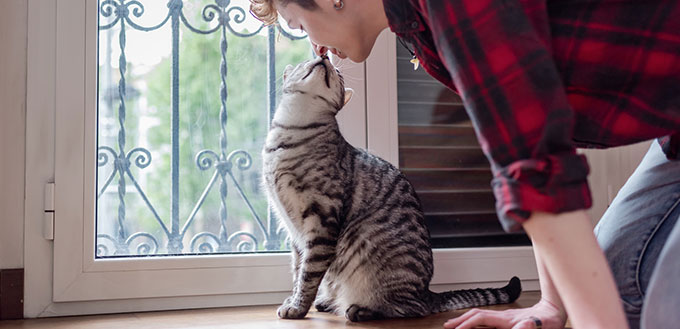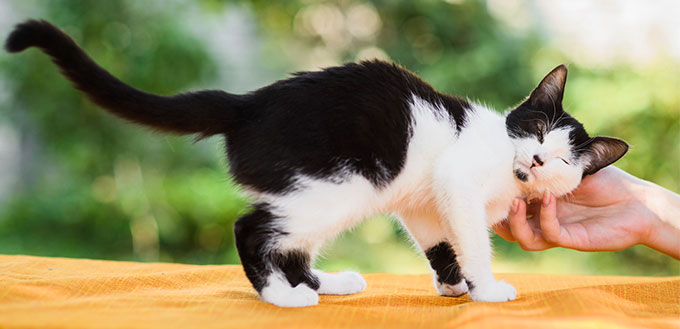If you have ever owned a cat before, you will certainly be in agreement that they have emotions and go through different moods. However, the question remains: which emotions do they experience? And how do they display these emotions in a way that we humans can understand them.
Do Cats Have Feelings?
It is certainly true that cats have feelings, but we only tend to understand them through the prism of our own emotions. And while felines do experience emotional swings, they are highly unlikely to be the same as our own. Human emotions also tend to display themselves more clearly through facial expressions, body language, etc. Cats have developed their emotional responses to be clear to other felines, which is why we may struggle ourselves to understand what is going on.
Do Cats Feel Love?
The question of do cats love their owners is one that is up for debate. They do not display their love in the same way that humans do – or even other pets like dogs. However, we do know that cats can make positive connections with their owners based on things like being fed and petted. In turn, they show this affection through many different ways such as purring, going to sit on your lap, and bumping heads with you. Many cats will only show this type of behavior with owners or people who they trust, but there are sometimes exceptions to the rule!
Which Emotions Do Cats Experience?
Now, we come onto the section where we look at the emotions that your cat displays.
- Anger
Studies have shown that cats are quicker to anger than dogs, and you may well have got on the wrong side of your four-legged friend from time to time. Perhaps you are trying to undertake a complicated procedure like clipping your kitty’s nails or you have simply touched them in the wrong way. Or they may display their angry signs towards other cats as a way of telling them to back off. A few common signs of anger include the swishing of the tail, fur standing high up on end, hissing, yowling, baring teeth, and their ears pulled all the way to the back of their head. If you see these signs, you are better off backing off from your pet to avoid antagonizing them any further.
- Happiness
While cats may not experience the same type of happiness as us, they can certainly feel a level of contentment. Often, this occurs through owner interactions, but it can equally be when they have found a lovely spot to lie in the sun. Purring is the most obvious sign of contentment, and you may even notice that your cat seems to have a happy expression on their face when you are scratching their cheeks or under their chin just right. Contented cats will often stand up high with their heads held back and tails on end. As they relax, you also may notice their eyes start to close a little bit.
- Sadness
Cats are creatures of habit, and a change of circumstance can often lead them to behave in an unusual manner. It could be that you have moved into a new house and they are mourning their old environment. Many owners also report a change in behavior when two cats have been living together for a long time and one dies. And there is no doubt that cats can suffer from separation anxiety if they are not given the love and attention that they so badly need. So, take the time to interact with your cat on a daily basis.
- Fear and anxiety
Fear is a protective feeling that all animals experience to keep them out of danger, but this may also manifest itself as anxiety even when there doesn’t appear to be a direct threat to their wellbeing. For example, this may occur during a particularly loud event such as a firework display or thunderstorm. It may even be the simple sight of their cat carrier as they associate it with unpleasant trips to the vet. When your cat is afraid, they may tuck their tail between their legs, their pupils often dilate, and ears will pull right back.
- Jealousy
It is much more difficult to tell whether or not your cat goes through more complex emotions like jealousy, but some owners do think that they recognize this in their feline friend. Perhaps you have a young baby who is taking all your attention and your cat is louder than normal or tries to butt in between the two of you. Or maybe your other cat has enjoyed a cat treat before the first. Of course, the signs of so-called jealousy are likely to manifest themselves as anger, so there may not be the same type of difference as with human emotions.
Can Cats Read Human Emotions?
Have you ever found yourself asking questions like can cats sense sadness or happiness in humans? There is a lot more evidence to suggest that dogs can tell what is going on inside our heads, but some studies have shown that cats can respond to things like facial cues. They may make associations based on your moods and what it means for them, but it is less likely that they know to comfort you when you are feeling a bit blue.
Final Thoughts
There is plenty of evidence to suggest that cats do feel basic emotions, though it is highly unlikely that they have the complexity of our own. By paying close attention, you can start to read cat emotions and adjust circumstances accordingly. Look at their body language, vocal cues, and any other changes to their normal behavior. For example, if you know that your cat is feeling angry, this should be the time to give them a little bit more space. And if you appreciate that they are feeling scared or anxious, you can do your best to remove the cause of the problem.
Sources:
- Jessika Toothman, Do Animals Have Emotions?, HowStuffWorks
- Lynn Buzhardt, DVM, Do Cats Mourn?, VCA Hospitals









